Developer: Impressions Games
Release Date: November 2, 1999
Pharaoh uses the engine from Caesar III but moves the setting to Ancient Egypt where you oversee the building of a city to ensure citizens are fed, employed, healthy and protected from diseases, disasters and wars. An expansion pack titled Cleopatra: Queen of the Nile followed in 2000, and modern digital retailers sell the pair as a bundle entitled Pharaoh + Cleopatra
Since the game was derived from the engine to Caesar III a source port called Akhenaten was forked from the Augustus source port to run the game.
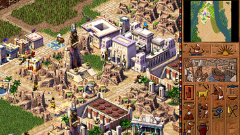
For more information on getting the game's data onto your Mac check our FAQ
Developer: GSC Game World
Release Date: October 2, 2009
I know I've used the term "hardcore" a bit on here but this game is not only pretty hardcore, the process of running it is going to be a little involved too.
S.T.A.L.K.E.R. is a series of survival horror FPS games set in a fictional dystopian version of Ukraine after a second Chernobyl disaster. You play as a stalker, someone who ventures into the wasteland looking for loot and encountering mutated monsters.
Combining elements of FPS games, survival horror, role playing elements and the bleak atmosphere and resource scarcity associated with Eastern European game development, the series has always had a fairly devout niche. The developer released a trilogy of games in three years, the last of which was S.T.A.L.K.E.R.: Call of Pripyat. In the years since the OpenXray project has worked on a source port for modern systems.
I try not to use the "Early Access" tag on here too often but it's appropriate here since we're hosting a build with some caveats. For now it's Apple Silicon only until I can hammer out some issues with Intel builds. The game also requires additional data to be present that is not in the original game data or in the app bundle, so there is a second file of data to download and install. Please read the instructions carefully.
KNOWN ISSUE: quitting the game via CMD+Q may cause the game to crash or hang, however exiting via the menu works correctly.
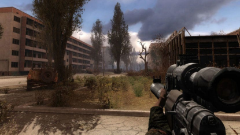
- In addition to downloading the DMG file above, download this file of extras.
- Create the directory "~/Library/Application Support/GSC Game World/S.T.A.L.K.E.R. - Call of Pripyat"
- Copy the "levels", "localization", "mp", "patches" and "resources" folders from an installation of S.T.A.L.K.E.R.: Call of Pripyat into it. For more info see our FAQ.
- In the "localization" folder you just copied, delete every file except for "base_sounds.db", "xefis_movies.db", and whichever language you want the game to run in. So for example, for english leave the "xenglish.db" file and delete the others (depending on how you installed the data these may already be the only three files).
- Unzip the extras file and copy the "gamedata" folder and the "fsgame.ltx" files into the folder as well
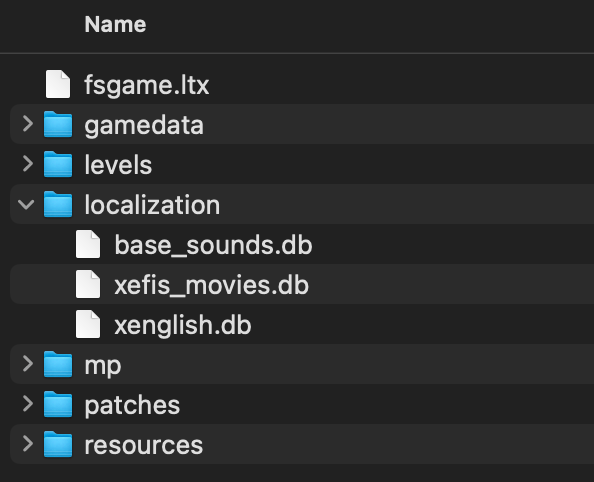
After this, OpenXray.app should be able to find the data and run.
Developer: Black Isle Studios
Release Date: December 10, 1999
There are games that are cult classics, and then there are games like Planescape: Torment that define the term cult classic.
So, true story: I'm working for a Babbage's circa 2001 or so and the Infinity Engine games are very popular. We had customers that came in asking for more. They'd played Baldur's Gate and its expansion and Baldur's Gate II and Icewind Dale and they wanted more and we would tell them sorry, there's not any more. Utterly and completely oblivious that this game with maybe the worst box art ever was indeed another Infinity Engine game and exactly what they were looking for.
Yes, Planescape: Torment is the game everyone wanted long after it was out of print. It uses a D&D setting that's unusual and it turns several RPG conventions on their heads, like how in some cases your character dying is how you *solve* a puzzle.
Note that like other Infinity Engine games, the GemRB project plays the original version, not the Enhanced Edition, but on places like GOG will also include the regular edition when you purchased the Enhanced Edition. Also note that according to the GemRB status page, Planescape: Torment is listed as finishable, but not yet polished.
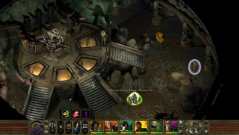
For more information on getting the game's data onto your Mac check our FAQ
Developer: Black Isle Studios
Release Date: August 27, 2002
So as much as the GemRB project is great, one thing people have pointed out to me is that you can already play modern versions of the Infinity Engine games like Baldur's Gate with the Enhanced Editions that are already native to the Mac, which is true. But one thing you'll notice is that there are five Infinity Engine games but only four Enhanced Editions. The fifth and final game, Icewind Dale II, has never had an EE.
The reason? The source code has been lost. Yeah, for whatever reason due to bad backups or the dissolution of the developer or just the state of source control around the turn of the century the source code has been lost.
My bet is that it turns up eventually in someone's attic (hey, it's happened before) but in the meantime the only way to play the game on a modern source port is if someone were to reverse engineer the differences and while that may be infeasible for commercial development, the GemRB project has stepped up to the plate and as of October 2024 the game is reported to be "completable".
Note that "completable" is not the same thing as "polished" so I'm labeling this as Early Access because it's more for the brave gamers who really want to play this lost game right now (reportedly it will be more polished in the forthcoming Version 0.9.4)
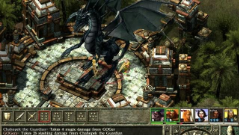
For more information on getting the game's data onto your Mac check our FAQ
Developer: 2015, Inc.
Release Date: January 22, 2002
This is a neat little surprise. The Medal of Honor series started out its life as a first person shooter for the original PlayStation, a console not known for FPS titles, and whose game concept and story came from Steven Spielberg of all people. The series has seen over a dozen games including a reboot but in 2002 they released the third game, Medal of Honor: Allied Assault, for the PC on the engine we would now call id Tech 3, with some help from the ÜberTools enhancements made by Ritual Entertainment.
While the source code was never released, the OpenMoHAA project appears to have taken ioquake3 as well as the Heavy Metal: F.A.K.K. 2 SDK (which used ÜberTools) and managed to make the game playable on modern systems. The result is not entirely unlike the Xash3D FWGS project.
The game supports multiplayer as well as the expansion packs, though the options for video configuration are limited at this time and the expansion packs need to be launched from the command line. If you're familiar with editing the configuration files for Quake III: Arena however, it's not much different than that. For rhese reasons though, we're labeling this Early Access. Later on we may add a launcher menu to simplify things.
NOTE: if you downloaded an earlier version there is a chance your save file might not work with this newer version. If that is the case and you want to continue from your saved game you can download the previous version here.
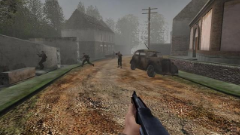
For more information on getting the game's data onto your Mac check our FAQ
Developer: Thalion Software
Release Date: April 11, 1993
Source Code Release Date: May 7, 2023
The Commodore Amiga was one of those computers where it jumped ahead of the competition by several miles, but then stayed there for a long time and got surpassed by the competition. I think this is why there's such a distinctive look to the games the platform and why it was so accessible to smaller game designers, the types we'd call "indie" today.
Ambermoon is an RPG for the Amiga that really looks like an Amiga game. It was the second part of an unfinished trilogy. Although the original game's source has been released, the source port we're pointing to is Ambermoon.net which like it sounds is a recreation of the original game in C#/.NET (the original game was Amiga-specific Assembly language and isn't a great candidate for portability).
In addition to being able to download it below from the developer's GitHub page, the game is also available on itch.io as a "Name your own price" download in case you want to support or tip the developer.

Developer: Voidpoint
Release Date: October 2, 2023
Source Code Release Date: October 2, 2023
Ion Fury: Aftershock is the expasion pack for Ion Fury. If you liked the first game you'll like the expansion pack because now there's more of it. Similar to the original game, the developer is not distributing Mac builds so our build is the only way to play it on the Mac short of rolling your own.
Thanks to a tip from the community, the issues building the EDuke32 source port have been resolved and so we are able to give you the latest version, capable of playing the expansion pack.
NOTE: the new version of EDuke32 may be incompatible with earlier saved games. If you need to revert to the old version it is still available here. Also you may need to select an "8-bpp" video mode on Apple Silicon Macs to achieve acceptable performance.
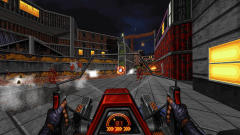
For more information on getting the game's data onto your Mac check our FAQ
Developer: Epic Games
Release Date: May 22, 1998
Also known as that game that convinced you to buy a Voodoo card, Unreal was released in 1998 after a lengthy development cycle. Although the name Unreal is primarily known today as a game engine licensing powerhouse, the original entry in the series is more than a tech demo, it's a fasinating glimpse in to what it was like to try and make a polygonal FPS game before most of the rules were well known. It's also a perfect example of a game where what you remember is much different than what you play today.
The OldUnreal team, responsible for bringing us the Mac port of Unreal Tournament have received permission from Epic to also release a build of the original Unreal for the Mac. Although the original game was available for classic Mac OS, this is the first Mac port of it in... nevermind how long it's been.
Note that we are labeling this an Early Access release since the OldUnreal team is labeling this build a pre-release. The original renderer has been replaced with a new Metal-based renderer and some glitches are to be expected, but the game is definitely playable.
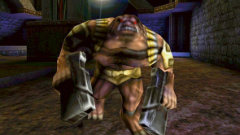
For more information on getting the game's data onto your Mac check our FAQ
Developer: KillPixel Games, Slipgate Ironworks
Release Date: February 27, 2024
Source Code Release Date: February 27, 2024
It's now official: WRATH: Aeon of Ruin is the newest game on this site because as of this writing it was fully released two days ago. Developed by KillPixel Games in conjunction with Irongate Slipworks, WRATH: Aeon of Ruin takes the concept of the retro boomer shooter one step further by actually using a game engine from that era: the DarkPlaces engine, derived from the original Quake engine, with a few parts of Quake III: Arena as well.
Originally released in 2019 as Early Access, the full release was finally released in February 2024. While the developer lists the Mac as a supported platform, the game is currently Windows-only but the use of DarkPlaces engine means the source code is available from day one.
At Mac Source Ports, we previously hosted a build of wrathplaces that would run with the Early Access version of the game, but the final released version featured enough changes that the build no longer works so I incorporated the changes. If you downloaded the previous release, you will need to update to the build below to work with the full version of the game.
NOTE: The game now features achivements but for obvious reasons our build is unable to tie into GOG or Steam to claim them.
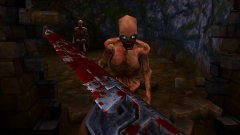
For more information on getting the game's data onto your Mac check our FAQ
Developer: Core Design
Release Date: October 24, 1996
In 2024, a remaster of the first three Tomb Raider games was released, but only on Windows. So, I figured now was a good a time as any to try and get a Mac build of a Tomb Raider source port going. This is where it gets weird, so... strap in:
Tomb Raider is a series where the source has never been released, so the efforts out there are all reverse engineered affairs. Most of the time when this happens you get one, maybe two and very occasionally three ports.
The original Tomb Raider game has five reverse engineered source ports, and thats just what I could find.
That was the first interesting thing. The second thing was that most of these only ran the first game. Core Design in the 90's cranked out five Tomb Raider games in five years. They clearly used an evolution of the same engine so most projects start with the first game and go from there, but they haven't perfected the later games yet.
Of the projects I found, the one named OpenLara was the most complete, both because it actually runs the game, menus and all, and also because the author and its community have ported it to all kinds of stuff, from the Sega 32X to the Game Boy Advance. So a Mac port seemed straighforward, and it was. The problem is the game data.
There's more information below in the installation instructions but the gist is that the Steam and GOG releases of the original game feature an ISO image of the original game and the Redbook audio tracks in MP3 format. And both of these need to be converted before you can run the game.
So I'm calling this one "Early Access" for now, because while it works, it takes some effort.
OpenLara only officially supports the first game. The second game loads but has issues when new enemies and mechanics show up. The third game loads and runs but Lara gets stuck in the geometry of the first level and that's as far as you can get. The fourth game doesn't load. I didn't even try the fifth. But if and when any of these improve, I'll update the build and add more entries.
In the meantime, embark on the epic adventure of getting the game running and then party like it's 1996 and you're sitting on the floor with your original PlayStation.
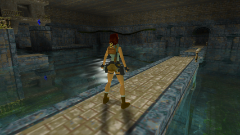
From the GOG or Steam installations, find the file named "GAME.GOG" (it has the same name even in the Steam version) and rename it "GAME.ISO"
Then use a utility like The Unarchiver (Mac App Store, free) and extract the contents of "GAME.ISO" to the "~/Library/Application Support/OpenLara/tr1" folder.
Then, from the GOG or Steam installations, take the MP3 files (there should be nine of them named 02.mp3, 03.mp3, etc.) and convert them to .OGG files using fre:ac (free, open source) or something like it.
Rename the files by prepending "track_" to each file (so, the converted version of 02.mp3 becomes track_02.ogg, etc.) and then move the .OGG files to "~/Library/Application Support/OpenLara/tr1" as well. If you don't do this step the game will still run but will have no music or audio in the cutscenes.
After all of this, OpenLara.app should be able to run and find the files for the game.
For more information on getting the game's data onto your Mac check our FAQ